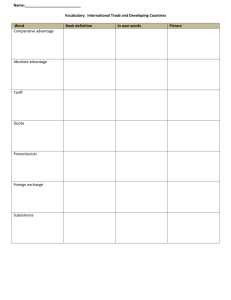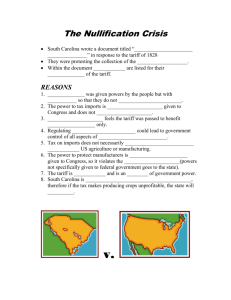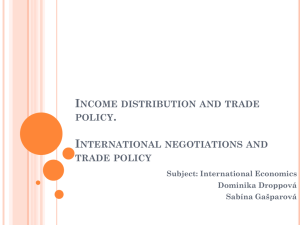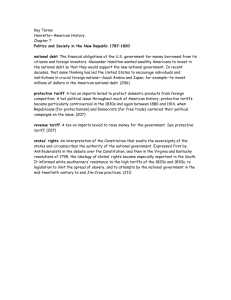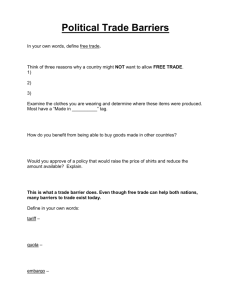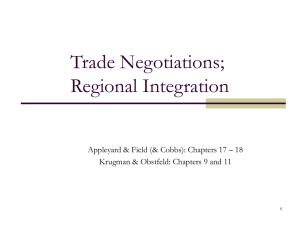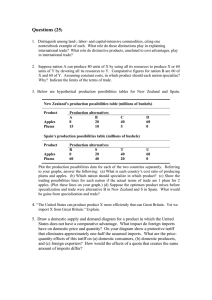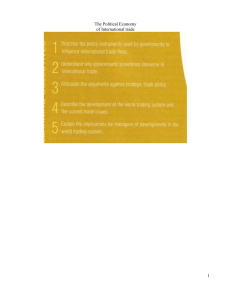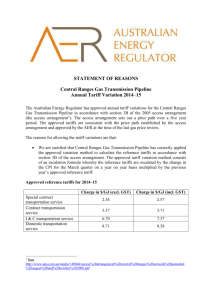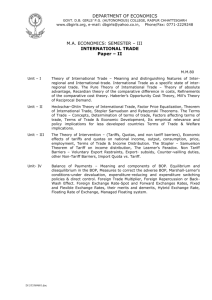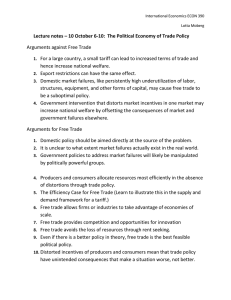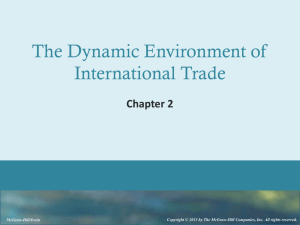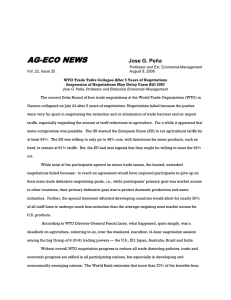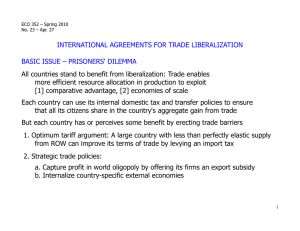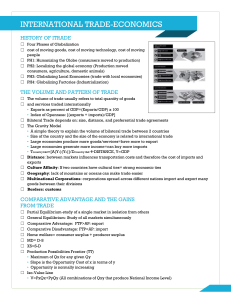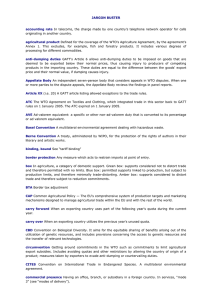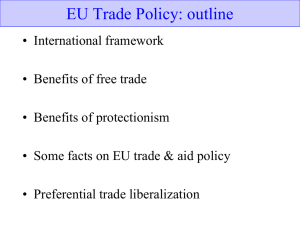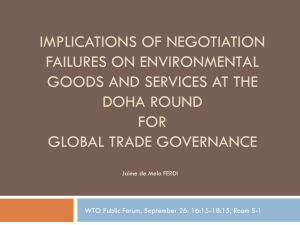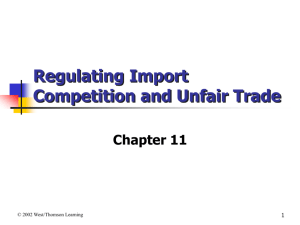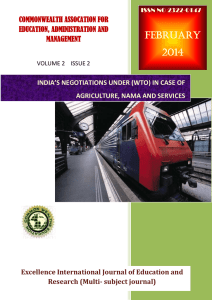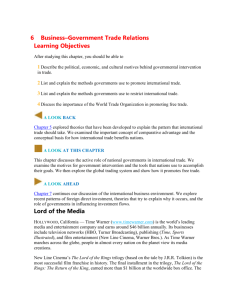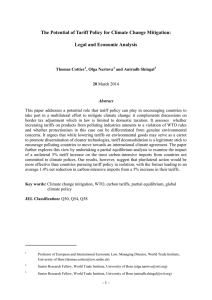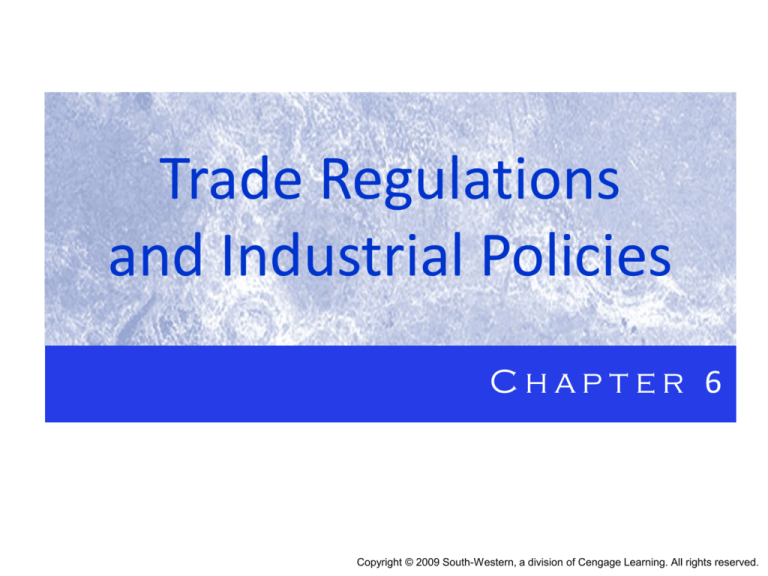
Trade Regulations
and Industrial Policies
Chapter 6
Copyright © 2009 South-Western, a division of Cengage Learning. All rights reserved.
U.S. Tariff Policy Before 1930
o originally revenue generators until the economy
developed alternate revenue sources
o Hamilton argued
for protection
based on infant
industries
o increase in tariff
rates during
Civil War and
World War I
Smoot-Hawley Act
o high point of U.S. protectionism - 1930
o caused retaliation by U.S. trading partners
o currency
depreciations
also used to limit
imports
o decrease in
world trade led
to further
economic
decline
o world trade in
millions of
dollars
Reciprocal Trade Agreements Act
o trade liberalization legislation
o presidential authority to negotiate bilateral
tariff reduction if reciprocal in nature
o most favored nation clause – agreement by
two nations to maintain tariffs to each other as
low as those applied to any other nation
o now called normal trade relations
o two exceptions – preferential tariffs on:
1) imports from developing nations
2) imports from nations that are members of
the same free trade area
General Agreement on Tariffs & Trade
o GATT - 1947 set of bilateral agreements to
reduce trade barriers
o originally not intended as an organization
o 1995 World Trade Organization replaced GATT
o basic principles:
1) nondiscrimination – normal trade relations or
most favored nation principle
2) national treatment – treat industries from
other nations
3) public good – results of negotiations by one
nation available to all nations
GATT Negotiating Rounds
World Trade Organization
o 1995 – Uruguay Round took effect - GATT –
was transformed into the World Trade
Organization (WTO)
o headquartered in Geneva
o international organization with 151 members
o multilateral trading system including trade in
services, intellectual property and investment
o dispute settlement: dispute panel with
established time limits and appellate body –
accused party unable to block final decision
WTO & National Sovereignty
o critics: WTO dispute settlement effectively
supersedes decisions by U.S. government
o counterargument: WTO findings cannot force
the U.S. to change its laws
o U.S. may choose to change its laws,
compensate foreign countries, or do nothing &
live with repercussions from other nations
o economists: benefits of membership, namely
normal trade relations with all members,
compared with the costs
Retaliatory Tariffs as WTO Enforcement
o The dispute-settlement system favors large
nations because retaliatory tariffs might
different impact on different nations.
o
o
If a small nation imposes a retaliatory tariff, the
result will be a decrease in national welfare.
(Chapter 4)
If a large nation imposes a retaliatory tariff, demand
and price throughout the world may change making
imports less expensive improving the terms of trade
ratio for the large nation.
o Purpose of WTO is supposedly to reduce trade
barriers not increase them; monetary fines
would be a more suitable penalty.
WTO & the Environment
Critics:
o race to the bottom – lower environmental
standards to the level of foreign competition
o developing nations might value increased
output and employment more than
environmental quality
Counterarguments:
o trade stimulates economic growth increasing
demand for a clean environment
o trade encourages dissemination of information
which can be used to protect the environment
Failed Negotiations
o 1998 Seattle negotiations on farm subsidies,
service trade, textile tariffs and manufacturing
fell apart because of disagreements between
developing nations and industrialized nations.
o Doha development agenda failed to produce
substantial changes as a result of broken
promises and unwillingness to negotiate.
Trade Promotion Authority
o also know as fast-track authority
o president notifies Congress of intent to enter
trade negotiations
o Congress has 60 legislative days to permit or
deny fast track authority
o upon approval, the results of the president’s
negotiations are subject to an up-or-down vote
without possibility for amendment
o instrumental in Uruguay Round Agreements of
1994 and the North American Free Trade
Agreement of 1993
Escape Clause
o definition - temporary relief to U.S. firms and
workers injured by increases in imports that are
fairly traded
o president can terminate trade concession or
levy trade restrictions
o common forms: tariff increases, tariff-rate
quotas, trade adjustment assistance
o can be enacted for 4 years and extended for
another 4 years
o example: Multifiber Arrangement – system to
restrict textile imports from developing
countries
Countervailing Duties
o definition – tariff imposed in retaliation against
export subsidies for foreign competition
o U.S. Department of Commerce investigates
claim
o temporary tariff applied if the preliminary
investigation finds reasonable indication of
export subsidy
o permanent tariff imposed if both Commerce
Department and International Trade
Commission determine export subsidy exists
o duty removed when foreign exports subsidies
are eliminated
Antidumping Duties
o definition – tariff levied against a foreign
producer:
1) whose prices on exports to U.S. are below average
total cost of production
2) or who sells to the U.S. market at lower price than
in home market
o must include evidence of dumping, material
injury, and link between imports and injury
o economists support antidumping laws that
address predatory pricing
Remedies Against Dumping
o product dumping or subsidies will lower prices in
various industries increasing consumer surplus
o a tariff equal to the margin of dumping reverses
trend raising prices to the original level under a fair
trade scenario
Unfair Trading Practices
o definition – actions by other countries that
hinder U.S. exports
o could include trade restrictions or foreign
subsidies
o authority established by Section 301 of the
Trade Act of 1974
o negotiated by U.S. trade representative subject
to approval of the president
o retaliatory tariffs or import restrictions as
ultimate sanction
o intent is to resolve through negotiations
Intellectual Property Rights
o intellectual property – invention, idea, product
or process registered with government
awarding the inventor exclusive right to use
o copyright – protects work of original authorship
o trademark – provides exclusive right to name
or symbol
o patents – gives inventor exclusive right to
make, use and sell the invention
o lack of effective international protection of IPRs
problematic when cost of copying is less than
cost of purchasing or leasing
Trade Adjustment Assistance
o free-trade and comparative advantage
arguments indicate that resources shift to more
productive activities from less productive
o trade adjustment assistance – provide
assistance to those incurring hardships due to
trade liberalization
o benefits include extended unemployment, job
training, and relocation and job search
allowances
o critics: programs do not resolve issues of
unskilled workers and assist only displaced
workers in manufacturing not service positions
U.S. Industrial Policy
o macroeconomic policies toward stability and
growth of GDP
o agricultural policy including disseminating
information and providing infrastructure
o largest purchasers of military goods stimulates
defense industry
o assistance to manufacturers in general
o export subsidies in the form of low cost credit
promotion through U.S. Export Import Bank
o Health Coverage Tax Credit program covers
65% of premiums for displaced workers
Strategic Trade Policy
o based on assumption that government can
help domestic producers capture profits from
foreign competitors
o implies government support for industries
important to future economic growth
o assumes imperfect competition in which trading
industries are dominated by a few large
companies
o example: aircraft industry with Boeing (U.S.)
and Airbus (EU)
o advocates argue that free trade theory based
on an assumption of perfect competition is
flawed
Strategic Trade Policy
o without EU subsidy results are unclear
o subsidy => produce is dominant strategy for
Airbus [5 better than 0 and 110 better than 0]
o Boeing forced into not producing [0 better than -5]
Economic Sanctions
o definition - trade restrictions used for domestic
or foreign policy objectives
o trade sanctions – boycott exports
o financial sanctions – limit aid or loans
o effectiveness
1) number of nations
imposing sanctions
2) degree of economic ties
to imposing nations
3) extent of political
opposition in target
4) cultural factors in target
nation

